The secret of better government? Citizens who complain
Citizens are becoming more sceptical and critical of their governments. Chris Welzel and Russell Dalton examine whether this phenomenon is good or bad for democratic stability by looking at the relationship between assertive and allegiant citizen norms and effective governance. They challenge the Burkean view that good government requires an obedient citizenry to function properly. Assertive citizens hold their politicians accountable – and their rising numbers should improve the quality of democracy.

Lawyers and magistrates protest in Paris, 2011. Photo: Marie-Lan Nguyen via a CC-BY 2.0 licence
If you read what the pundits and political scientists say about the state of contemporary democracies, you might conclude that the sky is falling. People are more critical of their governments, frustrated by political parties, and have little confidence in their political institutions. There is a surge in support for populist parties in Europe, the British voting for Brexit, and “The Donald” winning the U.S. presidential elections. OMG. This ‘malaise’ has worried political observers for many decades, with the crisis of democracy always seemingly a few years hence. Our empirical study suggests a different conclusion.
The worries about democracy in crisis partially arise because experts think of the protypical good citizen based on the classic democratic political culture studies. The landmark Civic Culture study described the British as deferential and Americans as allegiant citizens. This became the normative model of good democratic citizenship. Today, the citizens in these two nations, and most other affluent democracies, have become “dissatisfied democrats” or “critical citizens.” And with this change in the political culture, many experts bemoan this new style of citizenship as contributing to volatile politics and the decline of democracies.
Our recent book, The Civic Culture Transformed, shows that the processes of social modernisation, rising citizen skills and expectations, and decreased deference toward authority are creating more critical citizens in most societies. Experts often focus only on their own nation, and attribute this trend to political events, scandals or specific national policy problems. Our first conclusion is that a broad cross-national phenomenon is affecting established and democratising nations. This occurs with different institutional structures, different party systems, and even when economic times are good. It’s part of the new reality for contemporary democracies, not something that can be fixed or easily changed by an institutional reform. This leads to our second conclusion, that critical citizens can be good for democracies—as hard as that may seem right now.
Measuring political cultures
Are sceptical citizens a good thing or a bad thing for governance? To answer this question we update our earlier research by combining new measures of citizen norms with measures of government performance.
We use data from the newest 6th wave of the World Values Survey to measure two contrasting patterns of citizenship norms. The allegiant norms index taps traditional norms of good citizenship: trust in political institutions, trust in people, belief in democracy, and willingness to comply with political rules (such as paying taxes and not unfairly seeking government benefits). The assertive norms index, by contrast, captures critical citizenship: belief in the citizens’ right to participate in the decisions affecting their lives, support for individual freedom, and a stress on equal opportunities.
Figure 1 plots national mean scores on both norms for 104 societies in the WVS. There’s substantial variation in the mix of these two norms. For instance, a combination of strong allegiant norms and weak assertive norms (in the lower right quadrant) characterises several less affluent and less democratic nations in East and Southeast Asia. The combination of weak allegiant norms with weak assertive norms is common in the post-Soviet world and several African nations. The mix of weak allegiant norms and strong assertive norms exists in France, Argentina, Slovenia, and other traditionally Catholic societies. Finally, strong allegiant norms with strong assertive norms characterise Scandinavian and other affluent democracies that are historically Protestant.
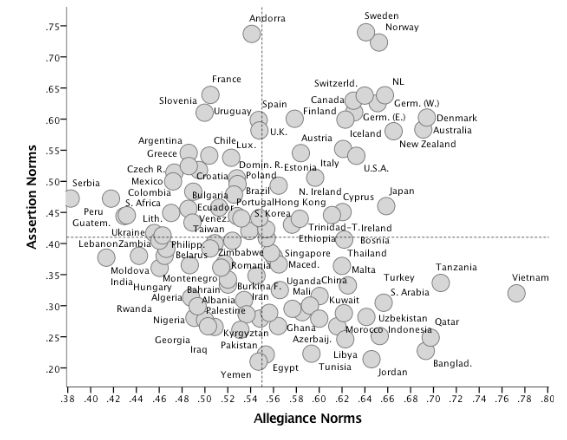
Figure 1: Allegiant and assertive norms by nation. Source: World Values Survey (N=104). The figure plots every nation ever surveyed by the WVS, using data from the latest available survey. The time points vary mostly between 2000 and 2012
Our research also shows that allegiant norms appear to be relatively stable over the past several decades, while assertive norms have been spreading. Social modernisation and generational forces are transforming the compositions of contemporary political culture.
The consequence of political cultures
To see how these norms affect governance, we construct two different performance measures using the World Bank indicators. The Voice and Accountability index assesses democratically legitimate governance, summarising information from several democracy indices into a single fine-grained measure. The Effective Government index uses “control of corruption” and “rule of law” to measure state capacity. If a state can prevent its officeholders from abusing their power for private benefit, and can enforce its laws, then it has a strong base for effective governance.
Rather than present the rich and extensive theoretical literature on the potential links between political culture and government performance (you can read our article), we encourage you to think about what you would expect. Should allegiant norms benefit or deter good government performance? How should this compare to the impact of assertive norms?
The evidence regarding allegiant citizenship and accountable government is strikingly clear (Figure 2). The level of allegiant citizenship in a nation has virtually no relationship with government accountability to its citizens (partial Rsqr=.02). (This figure plots the partial relationship, controlling for assertive citizenship and other national traits). Allegiant citizens typically vote and follow the rules, but they are less likely to challenge government or press their political claims between elections. Allegiant citizens are deferential citizens.
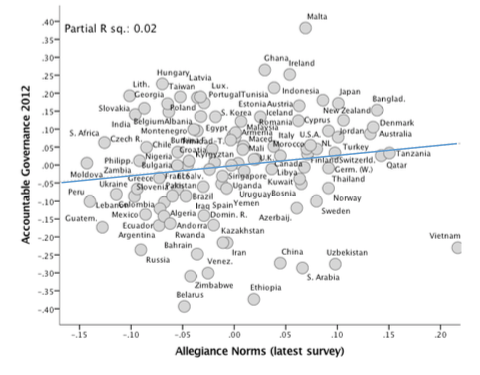
Figure 2: Allegiance norms and accountable governance. Source: World Values Survey most recent survey for cultural norms, GPI database for accountable governance; relationships controlling for other factors
In comparison, Figure 3 shows a very strong relationship between the levels of assertive citizenship and government accountability (Rsqr=.64). In short, governments are like waiters in a noisy restaurant: to get their attention you have to speak up. The waiters might not like clamouring clients, like politicians don’t like clamouring citizens, but it’s needed to get service.
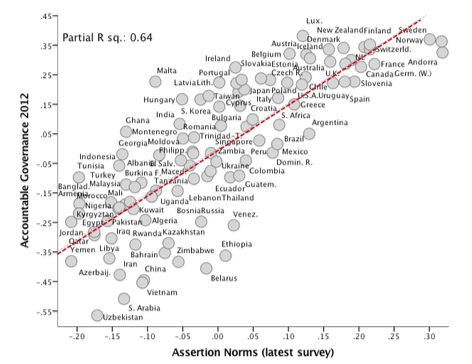
Figure 3: Assertive norms and accountable governance. Source: World Values Survey most recent survey for cultural norms, GPI database for accountable governance; relationships controlling for other factors.
Less theoretically predictable is the impact of citizenship norms on the effectiveness of the state. Many conservative analysts worry that an assertive citizenry may overload governments with their demands, and actually erode performance. This fear seems to be justified: We’ve just shown that assertive citizens are linked to high levels of citizen input and government accountability.
Cultural influences on effective governance follow a pattern similar to government accountability (Figure 4). Allegiant norms show a positive and significant effect on governance, while controlling for assertive norms and other national traits (Rsqr=.23). Performance is higher if citizens defer to authority and follow the rules. Hence, there are some benefits in allegiant norms.
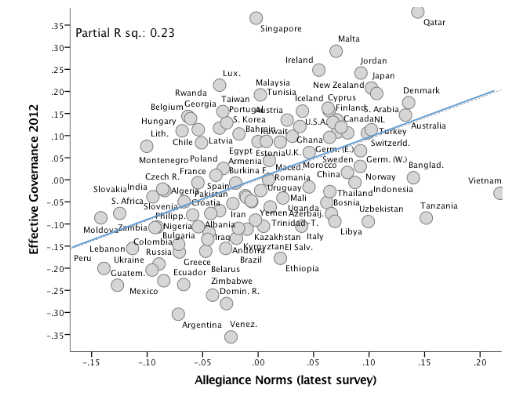
Figure 4: Visualisation of cultural norms and effective governance by nation. Source: World Values Survey most recent survey for cultural norms, GPI database for effective governance; relationships controlling for other factors.
However, when countries have more assertive norms than other societies, while controlling for allegiant norms, this is an even stronger stimulus for government performance (Rsqr=.57). Figure 5 shows that this pattern is most clearly represented by the Scandinavian countries as well as other affluent democracies. At the opposite end of the distribution, when a society’s assertive norms are weak, their effective governance is worse. This pattern is typical for many Islamic countries (like Egypt, Iran, and Pakistan) as well as Belarus, China, and Russia. However, there is also considerable variation in assertive and allegiant norms within global regions, with predictable effects on governance. In short, waiters—and governments—listen more and do better when the clientele is assertive (our apologies to waiters for comparing them to politicians).
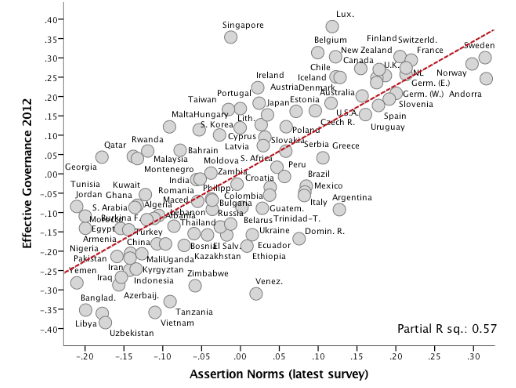
Figure 5: Cultural norms and effective governance. Source: World Values Survey most recent survey for cultural norms, GPI database for accountable governance; relationships controlling for other factors.
The lessons learned
Ever since Edmund Burke, conservative thinkers propagate the belief that political systems need loyal citizens to function well. Still today, pundits advocate the view that decision makers can meet their duties, solve problems and provide high quality public services, only if the public respects their authority and lets them do their job without interference. But the myth of “undisturbed leadership” overlooks the fact that governance is a customer service function: if the customers have no demands or don’t raise their voices to make these demands heard, the service providers don’t listen and aren’t doing their best for the public interest. And in autocratic societies, allegiant citizens are encouraged because they defer to the autocrats.
It’s not surprising that policy makers in London, Brussels, Washington and other political centres long for a return to a more halcyon political age. However, unless a country is blessed by the rare occurrence of benevolent leaders, assertive citizens are needed to generate the steam needed to fuel the engine of accountable and effective government. The qualities of the citizens as well as those of the politicians matter for good institutions. The good news is that these assertive citizens are on the rise throughout mature democracies and beyond. The evidence also shows that the process producing more assertive citizens is the emerging knowledge society, which includes expanding education, skill specialisation and broadening information access. This means that if we look beyond the political tensions of the moment, rising assertive citizens can be a good thing for democracy in the long term.
This post represents the views of the authors and not those of Democratic Audit. It is based on an article in the Asian Journal of Comparative Politics, Cultural change in Asia and beyond: From allegiant to assertive citizens, which is free to access for readers of this post.
Christian Welzel is Professor for Political Culture Research at Leuphana, University of Luneberg.
Russell Dalton is Professor of Political Science at the University of California, Irvine.
Also by Russell Dalton:





 Democratic Audit's core funding is provided by the Joseph Rowntree Charitable Trust. Additional funding is provided by the London School of Economics.
Democratic Audit's core funding is provided by the Joseph Rowntree Charitable Trust. Additional funding is provided by the London School of Economics.